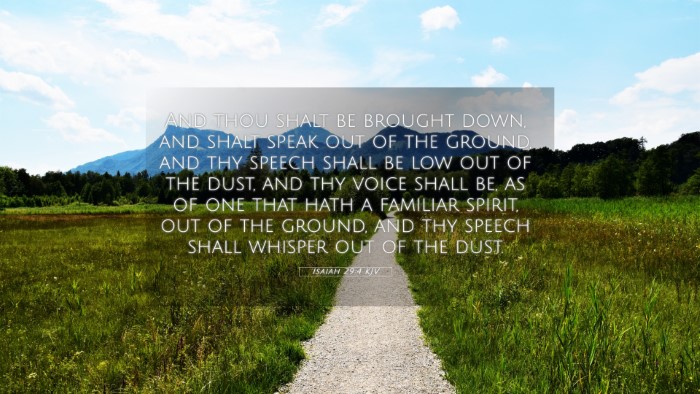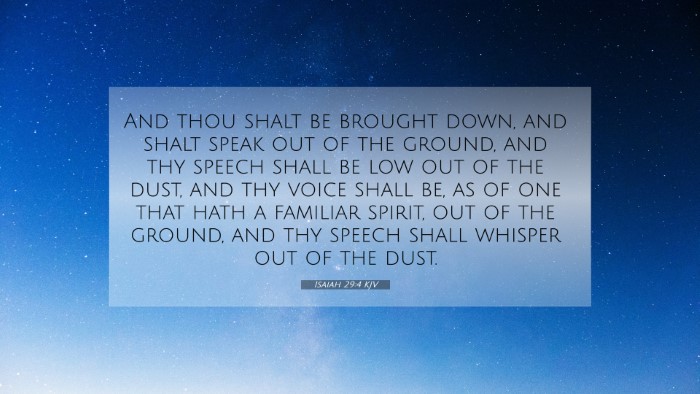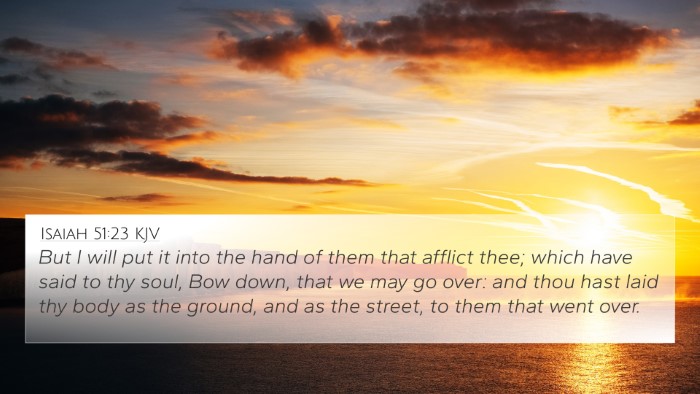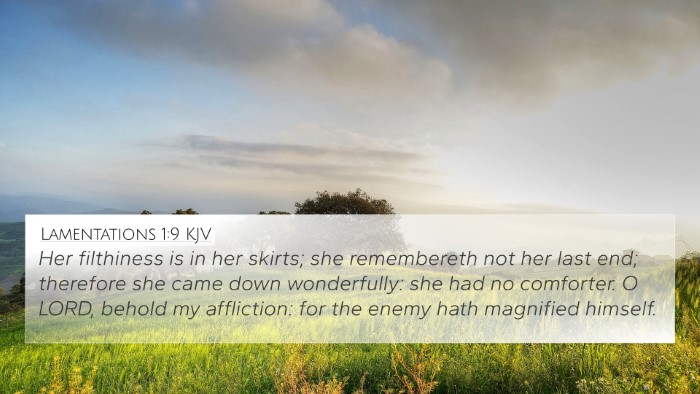Understanding Isaiah 29:4
Isaiah 29:4 states: "And thou shalt be brought down, and shalt speak out of the ground, and thy speech shall be low out of the dust, and thy voice shall be, as of one that hath a familiar spirit, out of the ground, and thy speech shall whisper out of the dust."
Verse Context and Overview
This verse is part of a passage prophesying impending judgment upon Jerusalem and the people of Judah. Here, Isaiah conveys a vivid image of the city's downfall and the resulting silence of its people. The metaphor of speaking from the ground underscores the loss of dignity and power, reflecting spiritual desolation as well.
Commentary Insights
Matthew Henry's Commentary
Matthew Henry observes that this verse speaks to the humbling of the proud and the reduction of the once glorious nation to a state of obscurity. He emphasizes that the metaphor of "speaking out of the dust" symbolizes a reversal of fortunes, highlighting the transition from prominence to vulnerability.
Albert Barnes' Notes
Albert Barnes elaborates on the theme of divine judgment articulated in Isaiah 29. He interprets the "familiar spirit" reference as an allusion to the people's reliance on necromancy and the occult, reflecting their spiritual decline. The voice from the dust signifies the futility of seeking wisdom and counsel outside God's will.
Adam Clarke's Commentary
Adam Clarke indicates that the verse evokes a sense of despair among the people, where the low, whispering voice represents the silent acknowledgment of their lost power. Clarke connects this state to the broader narrative of judgment that comes with disobedience and disregarding divine instruction.
Thematic Connections and Cross-References
Isaiah 29:4 presents powerful themes of judgment, humility, and spiritual decline. Below are some relevant themes and cross-references that amplify its significance:
- Isaiah 1:25-26 - God's intent to restore Jerusalem's nobility after purging it of impurities.
- Psalm 22:15 - The expression of deep distress, similar in depicting a state of despair.
- Micah 7:10 - A reflection on the enemies of God's people seeing their demise.
- Jeremiah 14:2 - The lamentation over the desolation of the land, connecting to the themes of spiritual drought.
- Matthew 11:20-24 - Jesus pronouncing woe upon unrepentant cities, emphasizing the fate of those who reject God's voice.
- Luke 16:19-31 - The story of the rich man and Lazarus resonates with themes of reversal in fortunes and the eternal consequences of choices.
- Ezekiel 12:27-28 - A warning of coming judgment that highlights the inevitability of prophetic words being fulfilled.
- 1 Peter 5:6 - An exhortation to humility aligning with the humbling nature of God's judgment.
- Revelation 3:14-22 - The call to the Laodicean church underscores the need for spiritual awakening amidst a state of pride.
- Hebrews 12:25-29 - A reminder to heed God's voice and the consequences of failing to do so, relating back to the theme of warning found in Isaiah.
Significance of Cross-Referencing Biblical Texts
Cross-referencing Biblical texts like Isaiah 29:4 enriches one's understanding by identifying connections and drawing parallels that deepen the interpretation of scripture. This process highlights:
- **Thematic Bible verse connections** - Linking verses that share similar themes enhances comprehension.
- **Scriptural cross-referencing** - Helps in contextualizing the message within the wider biblical narrative.
- **Bible verse parallels** - Identifying patterns in God’s dealings with humanity promotes a holistic view of scripture.
Tools for Bible Cross-Referencing
Utilizing various tools is crucial for effective cross-referencing, including:
- Bible concordance - A reference book listing words found in the Bible and their locations.
- Bible cross-reference guide - Guides offering systematic references between related scriptures.
- Bible cross-reference system - Frameworks that organize passages thematically and contextually.
- Cross-reference Bible study methods - Strategies for studying the Bible through comparative analysis.
- Comprehensive Bible cross-reference materials - Resources that compile extensive cross-references for deeper study.
Conclusion
Isaiah 29:4 serves as a poignant reminder of the consequences of spiritual apathy and the necessity for humility before God. By examining this verse alongside its cross-references, readers can glean profound insights into the nature of God's judgment, the importance of listening to divine guidance, and the transformative power of repentance.








